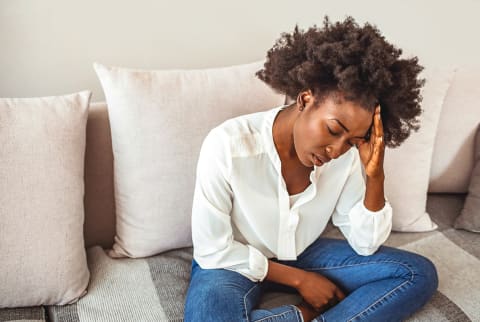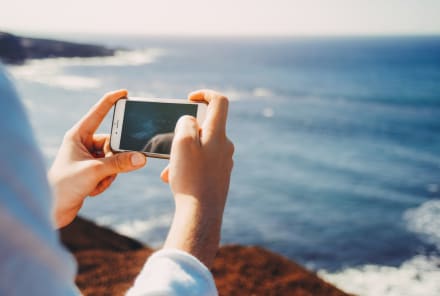Advertisement
The Sneaky Triggers For Morning & Evening Headaches (Yes, They're Different)


Loud music, bright screens, strong perfumes, and harsh lights all share one thing: They can trigger migraines. Migraine sufferers know there's nothing worse than trying to play detective to figure out what tipped off their intense pain.
However, new research suggests when you get your migraine may give you a hint about its triggers. Here are the study findings and how to use them to find relief:
Poor-quality sleep increases the risk of morning migraines by 22%
A new study published in the journal Neurology found that a night of poor-quality sleep increased morning migraine risk by 22%. Researchers also found that low energy the day prior increased migraine risk by 16%.
However, poor sleep and low energy didn't raise the risk of afternoon headaches. Instead, a day of high stress and high energy increased the risk of migraines later in the day by 17%. These findings suggest that when you get your migraine could help clue you into its root cause.
Nearly 500 people ages 7 to 84 (61% of whom identified as female) participated in this two-week study. To measure their sleep scores, they wore actigraphy monitors, which are similar to other wearable sleep trackers. They also kept digital diaries of spikes in energy, stress, anxiety, and overall mood.
This research study didn't find any links between anxiety and depression and migraine risk. This doesn't mean mental health concerns can't contribute to headaches, but they didn't seem to among this particular cohort.
The take-home message here is to focus on high-quality sleep—whether or not you suffer from morning migraines. Clocking a solid night's rest is essential for optimizing brain function1, skin health, metabolism2, and so much more.
3 tips for better sleep
There's no better time to start than now. Below, three quick tips for better rest:
- Set the scene: Your bedroom should be primed for sleep. Make your space a cool temperature, find sheets you love, try a soothing sound machine, and do your best to skip (or at least limit) the late-night scrolling.
- Take a magnesium supplement: Magnesium is a powerful mineral for sleep. Not only has it been shown to help overall sleep quality3, but it also stimulates GABA receptors4 to encourage stress relief, which is especially important for those with afternoon and evening headaches, according to the study. If you're seeking magnesium support, consult this list of expert-approved supplements.
- Start tracking your sleep: Wearable sleep trackers can help you identify which parts of your sleep routine need the most love. Are you low on REM sleep? Perhaps you could use a more consistent sleep schedule? These are just a few questions wearables can help answer. We've extensively tested countless devices—here are our top four picks to consider.
The takeaway
Poor-quality sleep was just linked to a 22% increased risk of morning migraines in a study on 477 people. Researchers also found a link between a day of high stress and energy with a higher risk of afternoon and evening headaches. Luckily, focusing on stress relief often benefits your sleep too. Here, 10 helpful tips to score great sleep even coming off a stressful day.
Watch Next
Enjoy some of our favorite clips from classes
Enjoy some of our favorite clips from classes
What Is Meditation?
Mindfulness/Spirituality | Light Watkins
Box Breathing
Mindfulness/Spirituality | Gwen Dittmar
What Breathwork Can Address
Mindfulness/Spirituality | Gwen Dittmar
The 8 Limbs of Yoga - What is Asana?
Yoga | Caley Alyssa
Two Standing Postures to Open Up Tight Hips
Yoga | Caley Alyssa
How Plants Can Optimize Athletic Performance
Nutrition | Rich Roll
What to Eat Before a Workout
Nutrition | Rich Roll
How Ayurveda Helps Us Navigate Modern Life
Nutrition | Sahara Rose
Messages About Love & Relationships
Love & Relationships | Esther Perel
Love Languages
Love & Relationships | Esther Perel

















